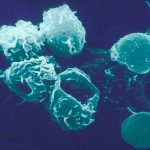Link to Pubmed [PMID] – 14764693
J. Immunol. 2004 Feb;172(4):2247-55
The TCR repertoire of a normal animal is shaped in the thymus by ligand-specific positive- and negative-selection events. These processes are believed to be determined at the single-cell level primarily by the affinity of the TCR-ligand interactions. The relationships among all the variables involved are still unknown due to the complexity of the interactions and the lack of quantitative analysis of those parameters. In this study, we developed a quantitative model of thymic selection that provides estimates of the fractions of positively and negatively selected thymocytes in the cortex and in the medulla, as well as upper-bound ranges for the number of selecting ligands required for the generation of a normal diverse TCR repertoire. Fitting the model to current estimates of positive- and negative-selected thymocytes leads to specific predictions. The results indicate the following: 1) the bulk of thymocyte death takes place in the cortex, and it is due to neglect; 2) the probability of a thymocyte to be negatively selected in the cortex is at least 10-fold lower than in the medulla; 3)

